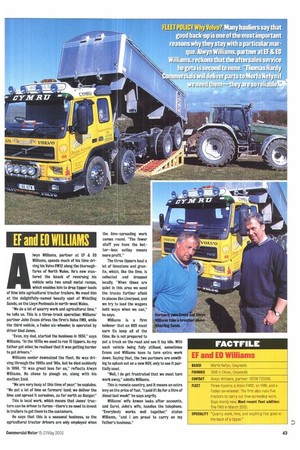EF and E0 WILLIAMS
Page 43

If you've noticed an error in this article please click here to report it so we can fix it.
AIwyn Williams. partner at EF & E0 Williams, spends much of his time driving his Volvo FM12 along the thoroughfares of North Wales. He's now mastered the knack of reversing his vehicle onto two small metal ramps, which enables him to drop tipper loads of lime into agricultural tractor trailers. We meet him at the delightfully-named beauty spot of Whistling Sands, on the Lleyn Peninsula in north-west Wales.
"We do a lot of quarry work and agricultural lime," he tells us. This is a three-truck operation: Williams' partner John Evans drives the firm's Volvo FM9, while the third vehicle, a Wen six-wheeler, is operated by driver Aled Jones.
"Evan, my dad, started the business in 1958," says Williams. "In the 1970s we used to run 15 tippers. As my father got older, he realised that it was getting harder to got drivers."
Williams senior downsized the fleet. He was driving through the 1980s and '90s, but he died suddenly in 1998. "It was great loss for us," reflects Alwyn Williams. He chose to plough on, along with his mother, Enid.
"We are very busy at this time of year," he explains. 'We put a lot of lime on farmers' land; we deliver the lime and spread it ourselves, as far north as Bangor."
This is local work, which means that Jones' tractors can be driven to farms—there's no need to invest in trailers to get them to the customers.
He says that this is a seasonal business, so the agricultural tractor drivers are only employed when the lime-spreading work comes round. "The fewer staff you have the better—less outlay means more profit."
The three tippers haul a lot of limestone and granite, which, like the lime, is collected and dropped locally. When times are quiet in this area we send the trucks further afield to places like Liverpool, and we try to load the wagons both ways when we can," he says.
Williams is a firm believer 'tat an HGV must earn its keep all of the time. He is not prepared to put a truck on the road and see it lay idle. With each vehicle being fully utilised, sometimes Evans and Williams have to turn extra work down. Saying that, the two partners are unwilling to splash out on a new HGV, only to see It partially used.
"Well, I do get frustrated that we must turn work away," admits Williams.
This is remote country, and it means an extra levy on the price of fuel. "I paid 81.9p for a litre of diesel last week!" he says angrily.
Williams' wife Anwen looks after accounts, and Carl, John's wife, handles the telephone. "Everybody works well together," states Williams, "and I am proud to carry on my father's business."




























































































































































